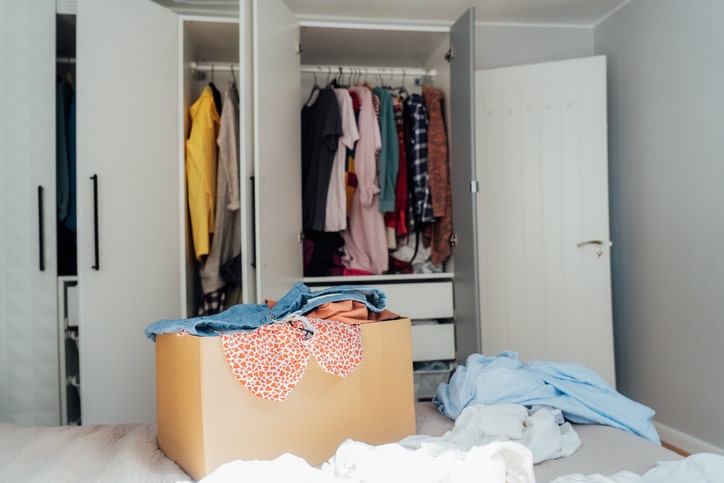Fighting Seasonal Depression by Decluttering Your Space

The sun sets earlier and earlier, leaving you without the warm sunshine and beautiful outdoors that can bring so much joy. Autumn slips into winter, the fall festivities are behind you, and what’s left is cold bleary weather and darkness.
For many, the approach of winter can also bring about a mental illness known as seasonal affective disorder, more commonly known as seasonal depression. If you suffer from seasonal depression, you may feel too exhausted to keep up with the tidiness of your personal space, allowing for clutter to accumulate when ordinarily it wouldn’t. Likewise, living in such conditions can continue to negatively affect your mental health, transforming your situation into a cycle that is difficult to escape.
If seasonal depression is weighing heavily on you, Copper Safe Storage wants to help in the best ways we can. Sometimes, what you need is some additional storage space to put that clutter out of sight and out of mind. Even if you’re just relocating the mess, improving your immediate surroundings can be a big first step toward beating the winter blues.
What Is Seasonal Depression?
Seasonal depression is considered a subset of major depressive disorder, and the symptoms are virtually the same: fatigue, hopelessness, and social withdrawal. You may feel disinterested in the hobbies you once loved and find that you’re sleeping and eating habits have changed.
What distinguishes seasonal depression from major depressive disorder is the timing. Seasonal depression episodes typically occur around the wintertime, whereas there are considerably fewer episodes throughout other times of the year.
Episodes can last for weeks or even months, and they can severely impair your ability to function. Seasonal depression is just as serious as other forms of depression, and treatment is often given the same approach.

The Correlation Between Clutter and Mental Health
Persistent fatigue and a lack of motivation can make it difficult to keep up with daily chores. Falling behind on your day-to-day tasks may put you in a situation where the mess is overwhelming, making it even harder to get started.
Because of this, there is a correlation between cluttered spaces and depression in the person living in them. It isn’t that the person with depression is gross or lazy. Instead, depression can affect anyone, turning what once felt like small, simple tasks into major drains of energy that the depressed individual can’t afford to complete.
Often, someone who is depressed does want to maintain a clean space and proper personal hygiene, but the fatigue makes even the small things too taxing to finish.
Decluttering for Your Mental Health
Correlation does not equal causation. This means that a messy room doesn’t cause depression; likewise, depression isn’t always the cause behind a messy room. However, being in a clean space is refreshing. Clutter in your home is overwhelming for your mind and creates feelings of guilt and shame. You may continuously feel like the work is never done and that the time you spend resting should be spent cleaning.
When you’re experiencing seasonal depression, you might have good days and bad days. You can’t necessarily predict when the good days will come, but when you do feel up to it, it’s a great time to take advantage and declutter your space.
1. Do it in small, manageable chunks.
You don’t have to conquer it all at once. You might feel like you have to wash all dirty dishes, dust, vacuum, complete all laundry, scrub the toilets, and take the trash out in the span of one day.
Instead, focus on one or two tasks you can handle that will help you feel better. Focus on completing them, and if you find you have energy left over, use it as you see fit. You can always take on more tasks another day.
2. It’s OK to throw things away.
If you aren’t using it, or if it causes more stress to find a place for it to stay, you’re allowed to throw things out. Old clothes that never get worn or don’t make you happy don’t need to be in your closet. Things you don’t use regularly don’t need to be readily available and can go into the trash or storage.
If you feel bad about throwing out usable items, drop them off at your local donation center to provide affordable options for those in need.

3. Reach out to trusted friends or family.
Shame and embarrassment make it difficult to ask for help, especially from those who are closest to you. They may be the people you trust most, but mental illness is also surrounded by heavy stigma, and fear of judgment can cause you to hesitate before reaching out.
However, you may be surprised by how willing people are to help their loved ones. Even if it’s only one extra set of hands to help you tackle the decluttering, the support itself may be just what you need to get the job done.
4. Put away the clutter in a self-storage unit near you.
When you don’t have things around to make messes with, messes are less likely to collect. You probably don’t need shorts, tank tops, and sundresses as much in the wintertime, or if it’s in the back of your cabinets never being used, you can likely do without having it at your immediate disposal.
Put it all away by renting a self-storage unit. Self-storage is excellent for expanding the space you have available to use, but it’s also away from home and doesn’t have to stay lurking in the back of your mind or the corner of your eye. You don’t even have to organize your unit nicely, though we do recommend it, especially for climate-controlled storage units in order to allow for proper airflow. Check out our page of storage tips to learn a few tricks for storing your belongings.
Copper Storage Management has self-storage facilities all throughout the country in many states. There could be one right down the street from you, making for an easy and convenient storage solution to help you declutter for your mental health.
Rent or Reserve Your Storage Unit With Copper Safe Storage
Self-storage from facilities powered by Copper Storage Management is affordable and suited for your lifestyle. Many of our facilities have drive-up storage units for easy loading and unloading, climate-controlled storage for giving your belongings an additional layer of protection from the heat or freezing temperatures, and extended access hours. Find a self-storage facility near you to get started today.
Find Additional Support for Seasonal Depression
Decluttering your space is a great way to improve your well-being and make seasonal depression more manageable, but it isn’t going to solve everything. Seasonal depression, just like other forms of depression, is something to take seriously. Your mental health and happiness matter.
Seasonal depression is often treated with medication, talk therapy, or other forms of therapy, but always call the 988 Suicide and Crisis Lifeline if you need immediate 24-hour confidential support.